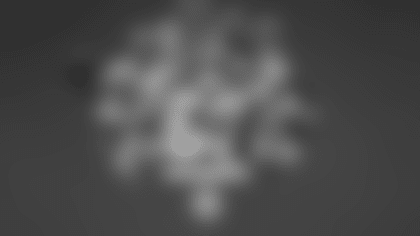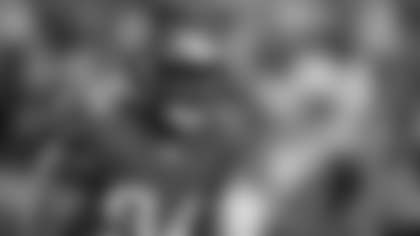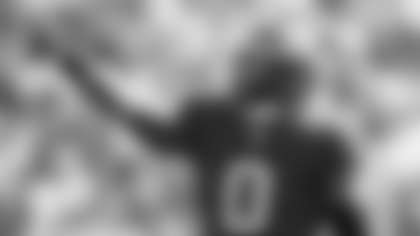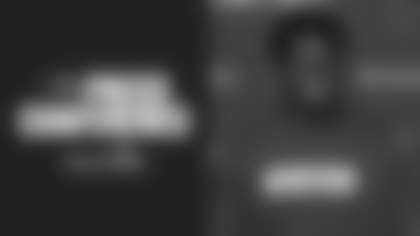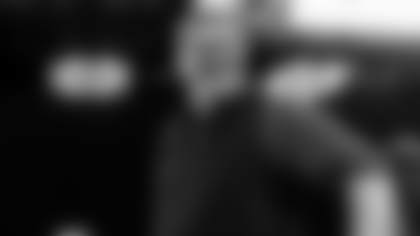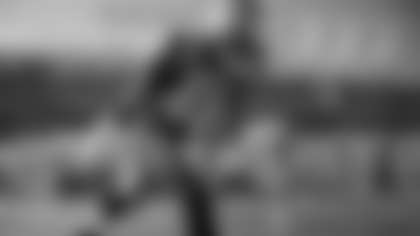Defensive Coordinator Todd Bowles put me up on the whiteboard.
No, really.
I gaped at him, shaking my head before he insisted I show him the last defensive formation I was studying (it was a split three-tech look against 11 personnel, which he later informed me would only be used in third-down situations. On first and second down, you'd instead have a one-tech and three-tech on the interior and I'm just gonna go crawl in a hole now). Shakily taking the marker off the ledge and drawing the initial center square with four surrounding circles representing the offensive line, I was immediately self-conscious. It was my fault for opening my mouth about how I was continuing to study the game and how much I still wanted to learn, but to my credit I didn't think that offhanded remark after we were done with this interview would amount to an NFL defensive coordinator taking enough of an interest in what I, a lowly writer, knew about the game he knows inside, out and backward.
But that just seems to be Todd. He's genuine, approachable and, by his own accord, astutely observant. That demeanor saw him reach the pinnacle of the NFL, a coveted '1 of 32' as the head coach of the New York Jets prior to arriving in Tampa Bay. Despite the new city now, he's already comfortable here, surrounded by guys he's known since his playing days at Temple. Yes, another Temple guy.
He's also indirectly familiar with this organization because of close relationships with the likes of Doug Williams and Tony Dungy. I told you this staff was connected…
Let's start in the beginning. Tell me about growing up in New Jersey.
It was tough. We grew up in the projects. My mother raised four of us – three boys, one girl. My sister was the oldest and I'm the youngest. It was good though, we had a lot of fun. We were outside playing a lot, let's say that. You had to have some street smarts and some street toughness. You kinda grow up that way. I was the one guy to play sports most of the time. The rest of them, everybody went their own way as far as being who they were. I learned a lot from my brothers and my sister of what not to do [laughs]. Both my brothers ended up going in the service. My sister went to college and I was the last one in sports, playing baseball and football.
You end up in football, though. Was it just because you were better at football?
I was actually better at baseball. I was a left-handed pitcher. I was a very good pitcher and I wanted to play both but I ended up hurting my arm at Temple so I didn't really try and play baseball. It was always either my shoulder or my elbow or my wrist. By the time I got healthy my junior year, I was already pretty good at football so I kind of let it go.
What was it that made you go to Temple? I talked to Keith [Armstrong] and you guys were there at the same time, right?
[Laughs] ohhh yeah.
Ok, you can't say it like that and not tell me more.
I'm a year ahead of Keith. When he came to visit the school, he stayed in my room. I was assigned to him as my recruit. We go WAY back. They gave him to me and my roommate. I can't even begin to tell you that story – he'd kill me if I told you that story.
[Todd was laughing all the way through that last answer but I could tell he was going to stay pretty tight-lipped about that recruiting visit.]
Well, it must have made up his mind to come to Temple.
Yes, it did. For some reason, he came anyway [laughs again]. Me and my roommate recruited him. Then, they switched his position his last two years [if you remember, from Keith's interview, Keith said he switched to defensive back at one point at Temple after being demoted from starting tailback in favor of Paul Palmer]. He was my backup. We have a long history.
Ok, ok, well what made you choose Temple, then?
At the time, I wanted to get away from home, but not too far. Rutgers was there and I didn't want to go to Rutgers. Temple, I was hoping I could try to play baseball, too. At the time, there weren't too many people that wanted you to play two sports. They wanted you to play one or the other. I went in hopes of making football then trying out for baseball but I never got to the baseball part.
So you get to Temple and then you're under Coach Arians for a couple years. What's the difference between that head coach Arians and this head coach Arians?
He cussed more.
More??
And he had more hair [laughs]. Other than that? Not much. Not much at all.
And from there, you end up in the league. You won Super Bowl XXII with the Washington Redskins, with a very familiar quarterback to Buccaneers fans…
Doug [Williams] gave me my first coaching job. He lived about a mile and a half down the street from me when we were on the team. His mother used to make my sweet potato pies for Thanksgiving. We scouted as we got out of playing, we both scouted the same area on the east coast. He was with Jacksonville and I was with Green Bay. We kept meeting up at the schools. He got a head [coaching] job at Morehouse and he asked me if I would be his defensive coordinator. I turned him down like five times. I had never coached before. I said, I know you have a million people you can consider other than me. He said, 'No, I want you.' Then I finally gave in and accepted, saying ok, let me try this out. The first day, I almost quit. It was tough the first day but after that, I liked it. He went to Grambling after a year so then I went to Grambling with him to be a defensive coordinator for two more years. I used to babysit [his son] DJ when we were at Grambling and he was running around at practice. We would hang out. He got me started in this whole coaching career. Me and Doug are extremely tight. He's like a big brother to me and we talk almost every week to this day.
He kind of pushed you into coaching, but you were in personnel. Was that more the path you initially saw yourself going?
I did not know, that's why I went into scouting. I could work my way from the ground up to see different avenues it had, whether I wanted to coach or stay on the scouting side. Obviously, I chose coaching, even though I had a great scouting staff in Green Bay. All those guys became general managers, pretty much.
Really? Who else was there?
It was me, John Dorsey, Reggie McKenzie, Scot McCloughan and obviously Ted Thompson and Ron Wolf were over us. There was a bunch of us. We were all the college scouts. All of them went to the GM side and I went to the coaching side.
And you made it all the way to Head Coach. What was that experience like? Was there anything that surprised you?
There was never any, 'I don't know about that,' you kind of learn as you go. It's just so much more than football. You have to grasp everything. That part of it, not that it was a problem, but as a coach, when you're a coordinator or position coach, you're in your own little bubble. I can coach football and go home. It doesn't matter if anything else happens because the head coach has to deal with that. Then I became the guy dealing with that. I had a sample size of it in Miami for those three weeks so that kind of helped me deal and I've had a lot of mentors and guys that I can talk to that have advice so it wasn't bad.
Who are some of those guys?
Again, Bruce was one. [Bill] Parcells is another. There were a lot of guys in the league, too. [Tony] Dungy was great for me, we go way back as well. Marvin Lewis helped me out a lot. Jeff Fisher was good. I've known quite a few guys.

Ok, well you know I have to ask…
Go ahead.
How do you envision this scheme changing here?
Well, it still remains to be seen off of personnel that I have and pieces that I have to add but I think I have some good pieces over there. We have Vita, Lavonte, obviously Carlton. Hopefully Hargreaves is healthy, Kwon is healthy, Gerald's over there, JPP, Nassib, you have some pieces to work with and that's exciting for me. I look forward to that and seeing what else these guys can do. The biggest thing is that they play together and they feed off of each other. That first and foremost, plus being fundamentally sound and then we can get into some schematics. The game is played in so many different personnel packages, you have to have both if you're trying to use them anyway, so health and where our strengths and where our weaknesses are will make a big determination there.
Right, like you said, you're not even in your base defense most of the time, anyway…
Right. There are wideouts everywhere these days so it's very difficult to do.
So basically it's going to be more based on what you see from the guys that are in place?
Yes.
Good to know. Switching gears, so to speak, all this change and the coaching lifestyle in general, I can't imagine you have a lot of time for hobbies but do you have any? You also have a Peloton bike in your office like Keith.
These things are unbelievable. It kills you but I love it. I have to get into an everyday mode. I'm so out of shape now [laughs]. My hobbies now? I listen to a lot of music. I'm a big music lover. All kinds except for heavy metal or opera. It doesn't matter whether it's rap, R&B, jazz, gospel, soft rock, country, doo wop, acapella, I have an extensive music collection.
Can you name a few all-time favorites or is that even hard?
Ooh. Gladys Knight. I love Jay-Z. It all depends on what genre you go to. I love The Eagles. I'm a big LL Cool J guy. Big Outkast guy, big Anthony David guy, Alicia Keys guy. Whether it's The Temptations or New Edition, it runs the gamut.
Do you listen to it while you work?
I only cut it off because you came in. It stays on.
Oh, shoot, excuse me.
[He turns up the volume on his computer and sure enough, Al Green is crooning away in the background.]
I can't work without music. I can't watch tape without listening to music. I can't workout without it. I pick my workouts on this [Peloton] bike based on the music. Whether it's the soul class or the 80s music class, they have live DJs, even. Once I get the family down here, I'll get into more of my routine with this thing. I'm here every morning at like 4:30 a.m. That's when I get my workout in. I get more work done because once everybody comes in, everybody is in each other's office. So I get more done, I'm early.
How has this been for your family? Because you've been a lot of places.
They've adjusted very well. I got three boys and the Mrs., obviously. They'll adjust and they're going to come down this weekend to look around, I'll show them around from what I can see. The boys are 16, 13 and eight.
Are they into football, too?
My eight-year-old isn't. He's autistic but he's smart. The other two are die-hard football and some basketball.
[With that, he pulls out his phone to show me a professional photo of all three boys he has on his phone.]
My 13-year-old is taller than my 16-year-old and 20 pounds heavier. That's the crew, plus the Mrs. She's originally from New Orleans and she can cook like it, too. That's the reason why I can't lose weight, she's making too much good food [chuckles].
That's pretty much it. As for me and how I am, I smile a lot, but I see everything and I know everything. I'm very observant. I can be very silly but I am extremely observant. And I have a good feel for people. I'm a face person as far as if a person can play or not play. If they don't have a football face…
I'm sorry, a football face?
It's just a look. You have a look. That tells me what kind of player you are or aren't. It's different depending on the person, it's hard to describe but… I've never been wrong.
Who has the best football face you've seen then?
I had this safety in Miami named Yeremiah Bell [whistles] he had it. He was a warrior. He really had it. It's just a look, nothing to do with the passion for the game, it's just a look. When you come in the room, you say – he has a football face. Or he doesn't have a football face.
Mental note: ask Coach Bowles who has the best football face on the Bucs after training camp.




